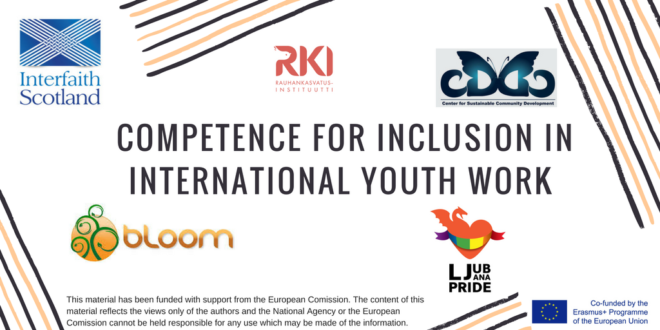Bune practici
Project presentation
Competence for Inclusion in International Youth Work
The project shares concrete measures to increase inclusive youth participation, reduce discriminatory attitudes, practices and inequality therefore enable equal and safe participation for all youth within Erasmus + programme.
The project and in particular it’s learning activities and the on-line platform create focus on sharing best practices on how to work with different young people in an opened, inclusive and sustainable manner and how to plan and implement Erasmus + programme activities in a manner that disabled young people, LGBTIQ+ youth, young people from various religious groups and with different ethnicities can participate in it without obstacles.
The project is the creation of five partner organizations and they come from different corners of Europe: Romania, Finland, Slovenia, Portugal and Scotland, being very experienced in working on inclusive youth work, but they all have different approach to it, having different target groups: women, LGBTIQ+ youth, rural and Roma youth, young people with disabilities, young people from minority religious groups.

During the project period, five learning activities are organized as well as three transnational project meetings. All the learning activities include visits to see local actors work in practice, workshops on sharing good practices and building new approaches for inclusion, project planning, interactive daily reflections and evaluation, learning about 8 key competences and Youthpass (individual and group work, feedback rules, self-reflection) as well as sharing methodologies about how to use Youthpass as an instrument for learning and recognition of non-form for youngsters with different identities and abilities. 125 people are directly be invovled in the international activities of the project and in total 3300 people are be involved in diffeerent parts of the project.
The expected results of the project are:
- Increase of awareness on structural and institutional discriminatory practices within youth work and Erasmus + programme and disseminate knowledge how to overcome them.
- Increase capacity (skills, knowledge and attitude) of youth workers to improve their practises and work in more inclusive manner.
- Increase safe participation and engagement of youth from discriminated and/or with unnormative identities in Erasmus + projects.
- Strengthen the networks of youth work organisations and equality/minority organisations
The project involves youth workers from each partner country who have a high level of expertise in involving young people from discriminated groups in local, national and international activities. Through these expert youth workers input the project gathers good practices shared amongst the youth workers participating the learning activities. Each organisation in the partnership has good practices to share. The practices and methods used in partner countries varies from organisation to organisation which assures the learning outcomes of the project to be useful for every organisation involved and also ensures diversification of method at the level of each organisation. Within the project we support and inspire junior staff of the organisations to be able to work with more inclusive approach and have better results on their daily work. The project aims to support youth workers to feel capacitated to organise more inclusive Erasmus+ projected and activities that young people with special needs and young people of minority groups feel encouraged, inspired and safe to participate in.
At the second level, based on the experienced shared by the youth workers participating in the learning activities, selected as presented in the application, from the partner organisation and beyond, form other youth work organisation, two dissemination tools ensure a widen the impact of the project: the online platform we build and the fact that all participants in learning events are encouraged and embowered to share their experience with other youth workers.
